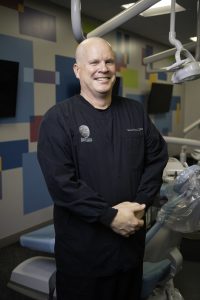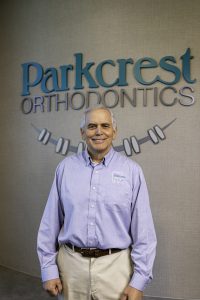We learn as children that brushing our teeth properly is important to protect against cavities. So we brush each and every day, twice a day at least, and we do so with enthusiasm — some of us, perhaps, with a little more enthusiasm than others. If you are brushing your teeth with the enthusiasm of a chef cleaning a grill, the experts at Parkcrest Dental Group would like to encourage you to back off the pressure just a little bit.
Yes. You can brush too hard and this can be detrimental to your oral health. Let’s take a look at what some of those detriments can be.
Enamel Erosion
Enamel erosion is the most common sign that you are brushing too hard. Often, you can see changes in your teeth enamel such as discoloration or stains. This is a sign that your tooth enamel has worn away and that the dentin underneath is showing through. Sensitive teeth is a sign of enamel erosion. The enamel is no longer there to protect the inner layers of your teeth, so they become more sensitive to high or low temperatures.
Gum Recession
Gum recession is typically a sign of gum disease, but in cases where harsh brushing and gum disease are both present, gum recession can accelerate. Aggressive brushing can irritate gum tissue and cause your gums to recede back from your teeth. If your gums are receding, you may see signs such as longer teeth or bleeding gums. Gentle brushing is key for optimal health of both teeth and gums.
Cavities
Has this ever happened to you? You diligently brush and floss twice a day. Then you go to your dentist at Parkcrest Dental Group for a check-up only to learn you have a cavity. How can this be? While there are many reasons this can happen, one of them is brushing too aggressively. As previously mentioned, brushing too hard can wear away enamel, leaving your teeth more susceptible to bacteria and acids that cause cavities
Parkcrest Dental Group Advises Brushing More Gently
Fortunately, brushing too hard can be easily fixed. Plaque doesn’t require a lot of pressure to be removed from your teeth. Be conscious of your movement when you brush. Are you sweeping in large strokes across your teeth?
If so, focus on small, precise movements that cover all surfaces of your teeth instead of large sweeping ones. Also, some of the problem might be with your toothbrush. The experts at Parkcrest Dental Group are a wonderful resource with whom to discuss the best toothbrush for your teeth.
Make Your Appointment with Parkcrest Dental Group Today
At Parkcrest Dental Group, we know that taking the best care for your teeth is all in the details. If you have questions about your technique, contact us today.





